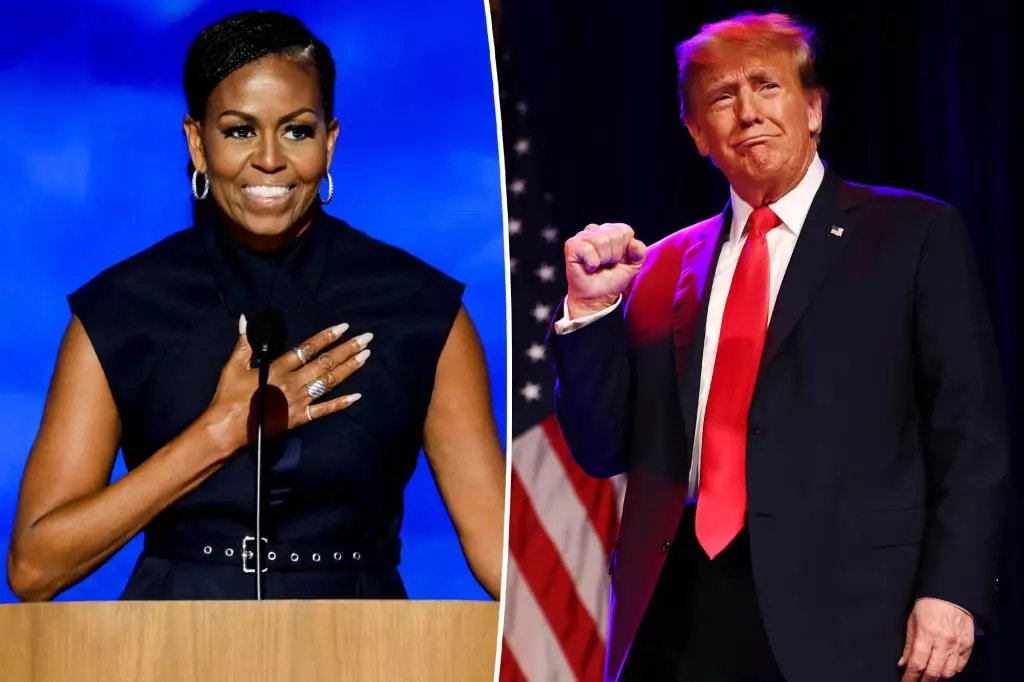The inauguration of a new president is traditionally a moment of political unity and a demonstration of democratic principles, where former leaders often join in ceremony to mark the peaceful transition of power. However, the decision of former First Lady Michelle Obama to skip Donald Trump’s inauguration in January 2017 surfaced as a poignant statement in American politics. Her absence, filled with unspoken implications, echoed her discomfort with the incoming administration and suggested a deeper, personal response to Trump’s political rhetoric and history.
While Michelle’s husband, former President Barack Obama, maintained a diplomatic posture toward Trump, engaging with him during public appearances such as Jimmy Carter’s funeral, Michelle chose an unequivocal stance of withdrawal. This dichotomy illustrates a significant difference in their approaches; Barack appeared willing to bridge divides through engagement, whereas Michelle’s actions implied a firm boundary. She did not merely abstain from the event out of a lack of interest but rather communicated a profound discontent with Trump’s ethos. The Obamas’ statement to the media simply confirmed this absence without offering excuses, which resonated deeply in a politically charged environment.
The comments from sources close to the Obamas emphasized Michelle’s refusal to participate in a façade of unity. She was described as “never being fake,” suggesting that her decision was an authentic reflection of her values and beliefs. Her absence served as a stark contrast to the expectations of former First Ladies, who typically participate in transitions, thereby challenging the norm in a climate of political tension.
A Legacy of Authenticity
Michelle Obama has consistently advocated for authenticity throughout her public life. Her speeches resonate with the challenges faced by marginalized communities, and her refusal to support Trump can be viewed as a defense of the principles she holds dear. When discussing her thoughts on Trump during the Democratic National Convention, she articulated her concerns about the normalization of divisive leadership that often undermines democratic values. Michelle’s critique of Trump’s rhetoric highlighted a perception of fear-mongering, particularly referencing his historical ties to the birther movement which aimed to delegitimize her husband’s presidency.
Her unequivocal stance reflected an increasing frustration among many Americans regarding the treatment of minorities and the general direction of the country under Trump’s influence. Michelle’s outspoken critique at the Democratic National Convention was not just a reflection of political beliefs but rather a passionate defense of her identity and the legacy she hoped to continue.
The absence of both Michelle and Barack Obama during significant transitional moments raises questions about the health of political discourse in the United States. In Michelle’s case, her decision to forgo the inauguration was symbolic of a broader disconnect felt among many citizens who viewed Trump’s presidency as a departure from the ideals of inclusivity and respect. Presidential inaugurations historically serve as a platform for national unity, yet Michelle’s choice to remain away underscored the divisions that had crystallized in American society.
Moreover, the contentious atmosphere surrounding Trump’s inauguration, particularly in light of the political climate and the events leading up to his election, illustrated the fractures in a society grappling with issues of race, identity, and governance. The tensions that manifested during the election were compounded by ongoing public debates and protests, making Michelle’s absence a resounding statement against what she perceived as a backlash against progress.
Since that notable absence, Michelle Obama’s public engagements have continued to reflect her commitment to advocacy and empowerment. She has emerged as a pivotal figure in discussions surrounding education, health, and social justice, emphasizing the need for active participation in shaping political narratives. Her focus has remained on uplifting communities and challenging the status quo through grassroots engagement rather than mere token appearances at politically charged events.
Ultimately, Michelle Obama’s decision to skip Trump’s inauguration can be seen as a powerful narrative of resistance amid political turbulence. It serves as a reminder that political presence is not always synonymous with participation. Her choice was a deliberate act that highlighted the importance of aligning one’s actions with core beliefs, setting a tone that continues to influence her work and remains relevant in current societal discussions.


Leave a Reply